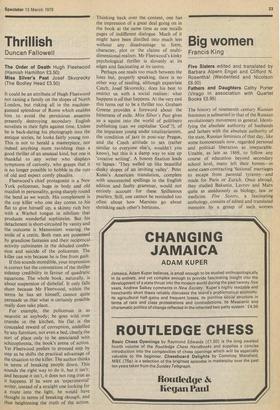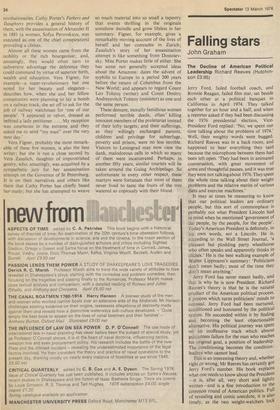Big women
Francis King
Five Sisters edited and translated by Barbara Alpern Engel and Clifford N. Rosenthal (Weidenfeld and Nicolson £6.50) Fathers and Daughters Cathy Porter (Virago in association with Quartet Books £5.95)
The history of nineteenth century Russian feminism is subsumed in that of the Russian revolutionary movement in general. Identifying the absolute authority of husbands and fathers with the absolute authority of the state, Russian feminists of that day, like some homosexuals now, regarded personal and political liberation as inseparable. Unable, as late as 1869, to follow any course of education beyond secondary school level, many left their homes—in some cases contracting 'fictional' marriages to escape from parental tyranny—and made for Paris or Zurich. Once abroad, they studied Bakunin, Lavrov and Marx quite as assiduously as biology, law or medicine. Five Sisters, a fascinating anthology, consists of edited and translated memoirs by a group of such women revolutionaries. Cathy Porter's Fathers and Daughters provides a general history of them, with the assassination of Alexander 11 in 1881 (a woman, Sofya Perovskaya, was executed as one of the chief conspirators) providing a climax.
Almost all these women came from the nobility or the rich bourgeoisie; and, amusingly, they would often turn to subversive advantage the deference they could command by virtue of superior birth, wealth and education. Vera Figner, for example—a super-revolutionary but one noted for her beauty and elegance— describes how, when she and her fellow conspirators were planning to lay a bomb on a railway track, she set off to ask for the job of railway watchman for 'one of our people'. 'I appeared in velvet, dressed as befitted a lady petitioner. . . . My reception was courteous in the extreme and they asked me to send "my man" over the very next day.'
Vera Figner, probably the most remarkable of these five women, is also the best writer; but she is run a close second by Vera Zasulich, daughter of impoverished gentry, who, amazingly, was acquitted by a sympathetic jury for her assassination attempt on the Governor of St Petersburg. It is on their narratives and others like them that Cathy Porter has chiefly based her study; but she has attempted to weave so much material into so small a tapestry that events thrilling in the originals somehow dwindle and grow lifeless in her summary. Figner, for example, gives a remarkably moving account of the lives of herself and her comrades in Zurich; Zasulich's story of her assassination attempt is like something from Dostoievsky. Miss Porter makes little of either. She has some not generally accepted ideas about the Amazons: dates the advent of syphilis to Europe to a period 200 years before the return of Columbus from the New World; and appears to regard Count Leo Tolstoy (writer) and Count Dmitry Andreyevitch Tolstoy (minister) as one and the same person.
These demure, morally fastidious women performed terrible deeds, often' killing innocent members of the proletariat instead of their lofty targets; and their sufferings, as they willingly exchanged parents, children and privilege for subterfuge, poverty and prison, were no less terrible. Visitors to Leningrad may now view the dank, malodorous cells in which so many of them were incarcerated. Perhaps, in another fifty years, similar tourists will be taken around the Gulag Archipelago. So unfortunate in every other respect, these martyrs were fortunate that most of them never lived to taste the fruits of the tree watered so copiously with their blood.



































 Previous page
Previous page